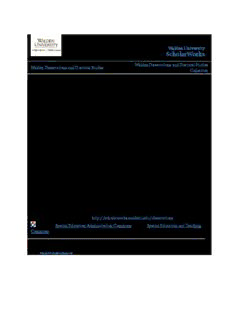Table Of ContentWalden University
ScholarWorks
Walden Dissertations and Doctoral Studies
Walden Dissertations and Doctoral Studies
Collection
2017
Teacher Perceptions of the Successful
Implementation of Co-teaching Services
Vanna Raybould
Walden University
Follow this and additional works at:https://scholarworks.waldenu.edu/dissertations
Part of theSpecial Education Administration Commons, and theSpecial Education and Teaching
Commons
This Dissertation is brought to you for free and open access by the Walden Dissertations and Doctoral Studies Collection at ScholarWorks. It has been
accepted for inclusion in Walden Dissertations and Doctoral Studies by an authorized administrator of ScholarWorks. For more information, please
[email protected].
Walden University
COLLEGE OF EDUCATION
This is to certify that the doctoral study by
Vanna Raybould
has been found to be complete and satisfactory in all respects,
and that any and all revisions required by
the review committee have been made.
Review Committee
Dr. Michael Jazzar, Committee Chairperson, Education Faculty
Dr. Crissie Jameson, Committee Member, Education Faculty
Dr. Mary Howe, University Reviewer, Education Faculty
Chief Academic Officer
Eric Riedel, Ph.D.
Walden University
2017
Abstract
Teacher Perceptions of the Successful Implementation of Co-teaching Services
by
Vanna E. Raybould
M.Ed, Grand Canyon University, 2011
BS, University of North Georgia, 2006
Doctoral Study Submitted in Partial Fulfillment
of the Requirements for the Degree of
Doctor of Education
Walden University
June 2017
Abstract
This project study addressed a lack of consistent instructional delivery of co-teaching
practices in a rural high school in middle Georgia. Though co-teaching services are
provided, teachers are not implementing co-teaching models with fidelity. Because co-
teaching teams are not trained together, teachers' efficacy in the delivery of co-taught
instruction has often been negatively affected. This project study provided insight into the
perceptions of co-teachers regarding the implementation of co-teaching practices.
Bandura's self-efficacy theory served as the conceptual framework for this study. Using
a qualitative, bounded, single case study design, the study explored the perceptions of co-
teachers and the planning practices that were used by teachers in a rural high school in
middle Georgia. A total of 9 general and special education co-teachers were recruited to
participate in the study. Qualitative data for the study were gathered through
semistructured interviews, a focus group interview, and lesson plan documentation. The
transcribed interviews and lesson plan documents were analyzed through open and axial
coding to generate themes. The findings revealed that teachers perceived a need for
further training in co-teaching methods to improve their self-efficacy in collaboration and
the implementation of co-teaching practices. The results of the study were used to
develop a professional learning project that benefits teachers by improving collaboration,
the implementation of co-teaching models, and co-teaching instructional strategies. The
project may contribute to positive social change by improving co-teachers' skills to
deliver effective instruction and increasing the self-efficacy of teachers to create a
supportive learning environment within their co-taught classrooms.
Teacher Perceptions of the Successful Implementation of Co-teaching Services
by
Vanna E. Raybould
MA, Grand Canyon University, 2011
BS, University of North Georgia, 2006
Doctoral Study Submitted in Partial Fulfillment
of the Requirements for the Degree of
Doctor of Education
Curriculum, Instruction, and Assessment
Walden University
June 2017
Dedication
This doctoral project is dedicated to my grandfather, Dr. Royce Turner, who
always encouraged me to learn and succeed. His memory will forever inspire me.
Acknowledgements
To my husband, John, thank for supporting me through this doctoral journey.
You helped me to persevere even when I felt like giving up, and you gave me
encouragement and a reason to succeed. I love you very much! To my family and
friends, I appreciate all of your kind words and motivation. I look forward to being able
to spend time with you again now that my project is finally complete! To my chair and
committee members, thank you for providing me with guidance and challenging me to
improve myself. I would not be here without your support!
Table of Contents
Section 1: The Problem ....................................................................................................... 1
Introduction ..................................................................................................................... 1
Definition of the Problem ................................................................................................ 2
Evidence of the Problem at the Local Level ................................................................ 5
Evidence of the Problem from the Professional Literature ......................................... 7
Definitions ....................................................................................................................... 8
Significance ..................................................................................................................... 9
Guiding/Research Question........................................................................................... 10
Current Research ........................................................................................................... 16
Implications ................................................................................................................... 27
Summary ....................................................................................................................... 28
Section 2: The Methodology ............................................................................................. 30
Introduction ................................................................................................................... 30
Qualitative Design ......................................................................................................... 30
Research Design and Approach ................................................................................. 30
Description of the Setting and Participants ................................................................... 31
Participants ................................................................................................................ 32
Procedures to Gain Access to the Participants .......................................................... 33
i
Establishing a Researcher-Participant Working Relationship ................................... 33
Ethical Considerations ............................................................................................... 34
Data Collection Plan...................................................................................................... 35
Justification for the Choice of Data ........................................................................... 35
Data Collection Instruments ...................................................................................... 35
Data Generation ......................................................................................................... 37
Potential Participant Response .................................................................................. 38
The Role of the Researcher ....................................................................................... 39
Data Collection .............................................................................................................. 40
Data Analysis ................................................................................................................ 41
Coding Procedures and Software Applications ............................................................. 41
Evidence of Quality ................................................................................................... 43
Discrepant Cases........................................................................................................ 44
Data Findings ................................................................................................................ 44
Research Questions 1 and 2 .......................................................................................... 45
Theme 1: Efficacy to Collaborate ................................................................................. 47
Theme 2: Efficacy to Implement Co-teaching .............................................................. 50
Theme 3: Relevant Training to Support the Implementation of Co-teaching ............... 53
Research Question 3 ...................................................................................................... 55
ii
Theme 1: Co-teaching Models ...................................................................................... 56
Theme 2: Grouping Strategies....................................................................................... 58
Theme 3: Accommodations .......................................................................................... 58
Outcomes ....................................................................................................................... 59
Conclusion ..................................................................................................................... 60
Section 3: The Project ....................................................................................................... 61
Introduction ................................................................................................................... 61
Description and Goals of the Project ......................................................................... 61
Rationale........................................................................................................................ 62
Project Genre Rationale ................................................................................................ 62
Project Content Rationale.............................................................................................. 63
Review of the Literature ................................................................................................ 63
Conceptual Project Alignment................................................................................... 64
Teacher Collaboration ................................................................................................... 65
Instructional Strategies .............................................................................................. 67
Differentiation of Instruction ..................................................................................... 69
Faculty Professional Development ............................................................................ 71
Project Description ........................................................................................................ 72
Potential Resources and Existing Supports ............................................................... 73
iii
Description:vi. List of Tables. Table 1. Student Demographics of District There is a problem in a local high school in middle Georgia in a lack of consistent . course assessments in the content areas of English, mathematics, science, and Ploessl, D. M., & Rock, M. L. (2014). Empire, Babur, and Akbar.

